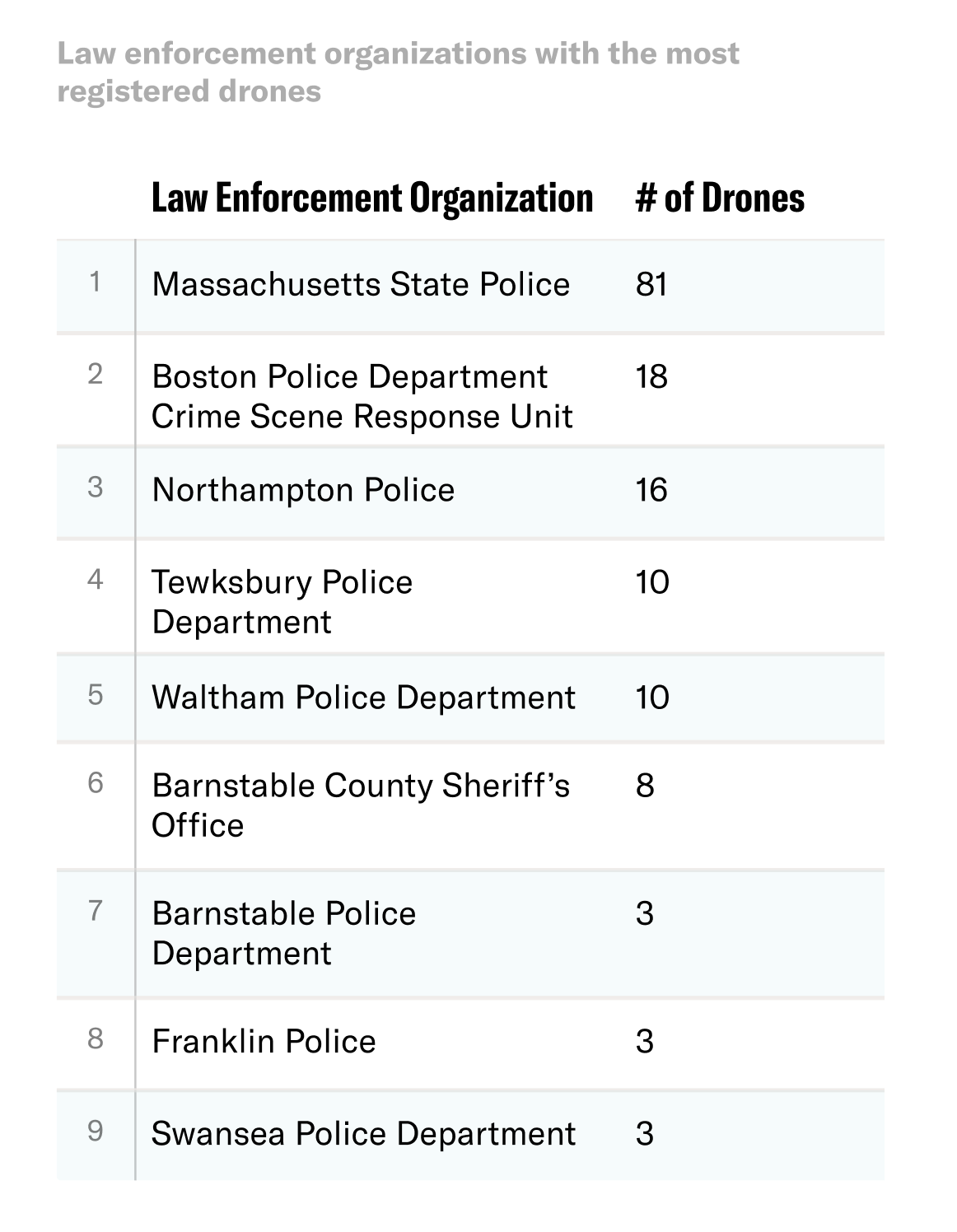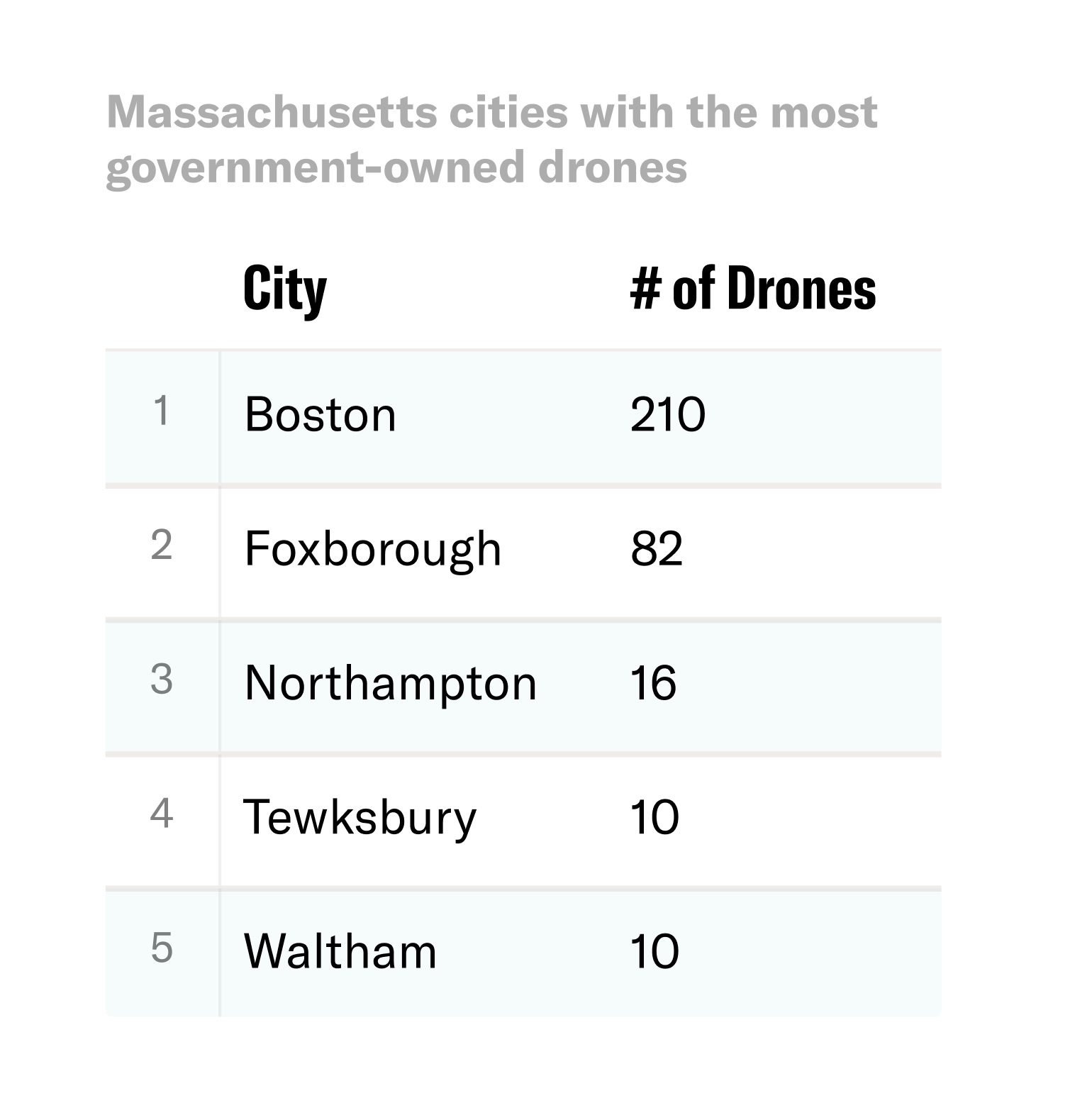Today, the ACLU of Massachusetts published new data on drones owned and operated by government agencies in Massachusetts. The dataset includes 431 drones (a.k.a. unmanned aircraft systems) along with their model types, physical locations, and agency ownership. The ACLU has created an interactive tool so anyone can explore the dataset and identify drones owned by public entities in their own communities.
Search Government Drones in Massachusetts
Public records request to the Federal Aviation Administration
The Federal Aviation Administration (FAA) oversees licensing for drones and unmanned aircraft systems nationwide. Before an agency can fly a drone, the device must be registered with the FAA. The FAA’s role in licensing drones makes it relatively easy to determine which government agencies are using them. Instead of filing hundreds of records requests with government agencies across the state, we only had to file one federal Freedom of Information Act (FOIA) request. So, in May 2021, that’s what we did. The data we obtained include drones owned by local and state law enforcement, as well as those owned and operated by other government agencies, like public universities and transportation entities.
Significant number of drones owned by law enforcement
The data show that Massachusetts police departments own a significant number of drones, with law enforcement drones making up nearly half (42 percent) of all those registered to government agencies in the state. The policing organizations with the greatest number of drones are the Massachusetts State Police, with 81 registered devices, and the Boston Police Department Crime Scene Response Unit, with 18.

High concentration of government drones in Boston and Foxborough
According to the data, there are 210 government-owned drones in Boston, the highest number of any MA city and almost half of all government-owned drones in the state. Most of these drones—189—are registered in East Boston and owned by the Massachusetts Department of Transportation’s Aeronautics Division.
Foxborough has the second-highest number of government-owned drones. All but one of the 82 drones registered there are owned and operated by the Massachusetts State Police.
Controversy with popular drone manufacturer
The most common drone model found in this dataset is DJI’s Phantom 4, with a total of 47 units owned by Massachusetts government organizations. While the data do not include specifics about any model’s capabilities or features, DJI advertises that the Phantom 4 has a max flight time of 28 minutes, a max speed of 20 m/s, and includes a camera for still photography and video.
DJI is by far the most popular company with Massachusetts government agencies, representing a whopping 85 percent of all drones documented in the dataset. The company’s strong business with Massachusetts government agencies is notable given that the Trump administration Department of Commerce placed it on the Entity List in December 2020, alleging that the company posed national security concerns and enabled human rights abuses.
Other drone companies have likewise faced criticism over human rights. A recent report on drone manufacturer Brinc highlighted a promotional video advertising weaponized patrol drones that could be used to target and assault migrants at the southwest border. A bill currently before the Massachusetts state legislature would prohibit the use of weaponized drones in the state, and would require police to get a warrant before using drones for surveillance in most circumstances.
Learning more about government use of drones in Massachusetts
The dataset published here tells us which entities have drones but does not provide information on how or when those drones are used. If you’re interested in learning about how government agencies in Massachusetts have used drones, you can use our model public records request to find out. More information about this process and resources are available through the tool linked below.
Search Government Drones in Massachusetts
If you find anything interesting, please reach out to us at data4justice@aclum.org and let us know.

